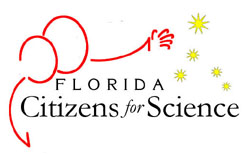 If you don’t already know, I volunteer as a board member and communications director for the statewide organization Florida Citizens for Science. We promote and defend sound science education in the Sunshine State. More of our energy winds up going into the defend part rather than the promote part, though. That group can go for many months with little activity but then suddenly go into overdrive. Such is the case now that the Florida legislature is in session and considering two sets of bills that could impact science education. One is about Instructional Materials and the other is about Religious Expression in Public Schools.
If you don’t already know, I volunteer as a board member and communications director for the statewide organization Florida Citizens for Science. We promote and defend sound science education in the Sunshine State. More of our energy winds up going into the defend part rather than the promote part, though. That group can go for many months with little activity but then suddenly go into overdrive. Such is the case now that the Florida legislature is in session and considering two sets of bills that could impact science education. One is about Instructional Materials and the other is about Religious Expression in Public Schools.
I’ve been very busy with the media on both bills. Here’s a list of what I’ve been up to.
Both Bills
Tampa Bay Times Gradebook blog podcast, March 14, 2017: Can science and religious expression coexist in Florida public schools?
Religious Expression in Public Schools
Palm Beach Post, March 7, 2017: Getting liberated from science in Florida’s ‘religious liberties’ bill
This is a red flag for the Florida Citizens for Science, a non-profit education group dedicated to the idea that “the proper focus of science education is the study of the natural world through observation, testing and analysis.”
The group’s communication’s director, Brandon Haught, a high school science teacher in Volusia County, wrote about the effects a bill like this might have if it became law.
“Does this allow students to give unscientific religious views as answers on questions about science topics such as age of the earth and evolution?” Haught wrote. “If a teacher tries to explain to the student how the religious answer is unscientific and incorrect, would the teacher be seen as discriminating against the student?”
Naples Daily News, March 14, 2017: Senate committee pushes ‘religious expression’ bill forward
Brandon Haught, a high school biology teacher representing the organization Florida Citizens for Science, says the bill would have detrimental effects specifically in science education.
“Does this mean that a teacher or school personnel can then talk about stuff like the age of the Earth and evolution from a religious perspective, and if someone was to try to counsel them not to do that, would that be discrimination against the teacher?”
Haught also raised concerns about students being able to refute what is being taught based on their own religious beliefs.
“This has a chilling effect on science teachers across the state who would prefer to short-change evolution instruction rather than deal with potential conflicts with students, parents and the community,” Haught said.
Miami Herald, March 14, 2017: Plan to fortify religious expression in public schools quickly advancing
One opponent of the bill — Brandon Haught, a Volusia County public school teacher and Florida Citizens for Science representative — warned that the chilling effect could go in the other direction, making teachers worry about teaching evolution for fear of discriminating against students who don’t believe in evolution on religious grounds.
“Does this allow the student to challenge a teacher by saying, ‘No, the earth is only 6,000 years old, and no, evolution didn’t happen’?” Haught said. “Can I as a teacher go back and try to remediate that student by saying, ‘No, we’re not trying to discriminate against your religious beliefs, but I need to tell you the science?’ ”
Instructional Materials
Naples Daily News, March 13, 2017: Teaching of evolution, climate change at stake in Naples legislator Donalds’ bill
“This has caused a chilling effect on teachers,” said Brandon Haught, a high school biology and environmental science teacher in Orange City, Florida.
He is a founding member of Florida Citizens for Science, a group that describes their mission as “defending against attacks on science education from lawmakers.”
Haught said many people find the teaching of evolution and climate change “inflammatory” and “unbalanced,” so, if Donalds’ bill becomes law, anyone who pays tax on a cup of coffee while visiting Florida could advocate teaching creationism and that climate change isn’t caused by humans.
If the majority of the school board agreed, those topics would be integrated into the curriculum of each public school in that district.
“We would definitely not want that being taught in a science classroom, because, well, it’s not science,” Haught said.
WBBH, NBC2, Fort Myers, March 14, 2017: Creationism, evolution optional in Florida classrooms with new bill
Donalds further said his bill would allow a balanced and non-inflamatory viewpoint on issues like evolution.
“To me, those are code words for saying I don’t like evolution,” said Brandon Haught of Citizens for Science.
Haught feels topics like climate change, which are currently taught in Florida classrooms, are in trouble.
“They’re trying to put some unscientific ideas into the science classroom,” Haught said.




